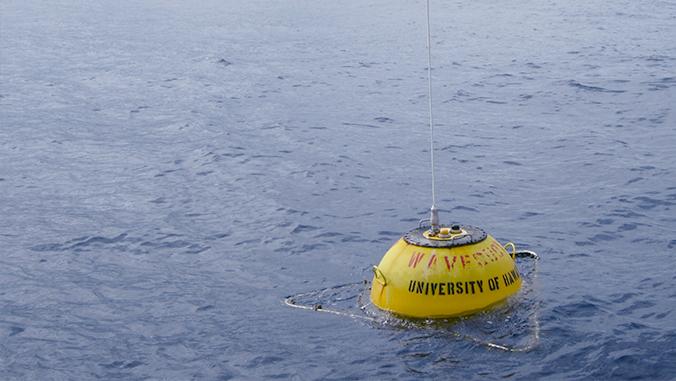UH Mānoa Receives $1.3 Million for Marine Energy Project

University of Hawaii wave measurement buoy at the Navy’s Wave Energy Test Site off Marine Corps Base Hawaii. PC: University of Hawai’i
The University of Hawai‘i at Mānoa School of Ocean and Earth Science and Technology received $1.3 million from the US Department of Energy for a project to improve marine energy technology. During the three-year project, UHʻs Hawaiʻi Natural Energy Institute will lead a team of researchers to develop a wave energy converter.
“Advancing next-generation marine energy will help the US ensure a secure, reliable, and enduring supply of American energy,” Under Secretary of Energy Mark Menezes said. “These early-stage research and development projects are key to the development of water power as part of DOE’s ‘all-of-the-above’ energy strategy.”
The project, named the Wave Focusing Energy Converter, uses an underwater disk to create a concentrated water flow to harness wave energy. Richard Carter, a graduate student who completed his doctoral degree at SOEST, came up with the idea for the project. Carter continued to develop the project as an independent researcher, joining forces with several experts from HNEI and the department of Ocean and Resources Engineering to mature the project.
“This project can be seen as one of many that are building toward Hawai‘i’s renewable energy goals. Our calculations suggest that this can be a power-generation methodology that produces encouragingly low-cost electricity,” Patrick Cross, HNEI researcher and project leader said. “To date, wave-energy conversion is still in the category of very early stage R&D, and costs remain quite high. We feel we have an approach that can lead to lowering costs–through high-conversion efficiency and relatively low, up-front costs–as compared to technologies under development elsewhere.”
Researchers and partners from UH Mānoa’s department of Physics, the National Renewable Energy Lab and Honolulu-based Sea Engineering, Inc. are also involved with the project.
More information about the project can be found online.










